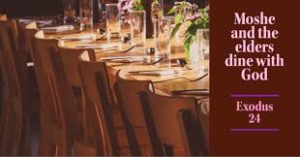They Saw the God of Isra’el
24: 9-11
They Saw the God of Isra’el DIG: Why does God let Moses and the seventy elders see Him but not Moses alone? How did Moses and Aaron, Nadab and Abihu, and the seventy elders of Isra’el see God and not die?
REFLECT: How is this meal similar, or dissimilar, to the Wedding Feast of the Lamb? In what sense have you seen God?
They saw God: To finish the covenant ceremony Moses and Aaron, Nadab and Abihu, and the seventy elders of Isra’el ascended the foot of Mount Sinai. They were entering into sacred space, even as YHVH had commanded them. Then, to our utter dismay and surprise, the Bible says: They saw the God of Isra’el (24:9-10a). The word saw here is not the normal Hebrew word meaning to see. It is a stronger, more intense term that is commonly used of prophetic visions. Its use here underscores the uniqueness of this event.463 This is the first occasion on which He is called the God of Isra’el. It is equivalent to that moment in a marriage ceremony where the officient says, “May I introduce you to Mr. and Mrs. So-and-so.” But what is shocking is that the Torah says: They saw the God of Isra’el. In what manner or revelation we do not know, we only know that they saw God. The text speaks only of His feet, or rather, what was below His feet – under His feet was something like a blue pavement made of sapphire, clear as the sky itself (24:10b).464 What they saw was similar to the description of the throne in the vision in Isaiah (to see link click Bq – I Am a Man of Unclean Lips). Yet it remains obvious that the revelation of God granted to the elders on Mount Sinai was higher and greater than any revelation which had been bestowed upon mankind before. Nowhere else in the Bible is it so matter-of-factly reported that they saw God. In this passage it says it twice (24:10a and 24:11b).465

They shared a meal: In Jewish eschatology there is a well-established belief that following the coming of the Messiah, God’s judgment on earth, and the resurrection of the dead, the righteous of the TaNaKh will be entertained by ADONAI at a great banquet (see the commentary on The Life of Christ Hp – The Parable of the Great Banquet). The banquet is said to be foreshadowed in the weekly Shabbath and in all of God’s feasts. The covenant meal upon the mountain was a type of the wedding supper of the Lamb, where Yeshua will present believing Jews and Gentiles from all ages as a bride to be proud of, without spot, wrinkle or any such thing, but holy and without defect (see the commentary on Revelation Fg – The Wedding Supper of the Lamb).466
They were saved by the blood: The Torah notes that God did not strike, or raise His hand against Moses, or Aaron, or Nadab, or Abihu, or the seventy elders of Isra’el as they beheld Him (24:11a). There is a biblical principle that assumes that no one can see God and live (33:20). Yet, the Torah states here that Moshe, Aaron, Aaron’s sons, and the seventy elders of Isra’el saw God, and they did not die! What is this mystery? How can mortal man even stand, much less sit and eat in the presence of God? The answer is in the story. The men who climbed Mount Sinai were first marked with the blood of the covenant. They still had the blood that was sprinkled on them after the reading of the book of the Covenant as they ascended the mountain. For the life of a creature is in the blood, and I have given it to you on the altar to make atonement for yourselves; for it is the blood that makes atonement because of the life (Leviticus 17:11). They saw God and lived! They were atoned for by the blood! The implication is that those mortals who bear the marking of the covenant blood can enter into the presence of God.467
Isra’el’s history continued for almost fifteen hundred years after this memorable occasion. But never again did their elders see the God of Isra’el, and never again did they eat and drink in His presence. Sin had its way with them. Their very next act was to break His Torah by worshiping a golden calf, and the next time we see them drinking it was of the waters of judgment (32:20). How wonderful to remember that what Isra’el (through their official heads) enjoyed for a brief time, is now ours forever!468



Leave A Comment